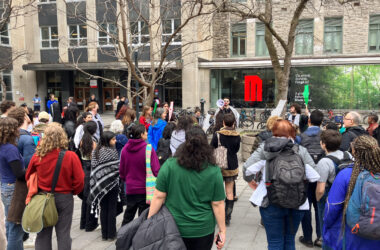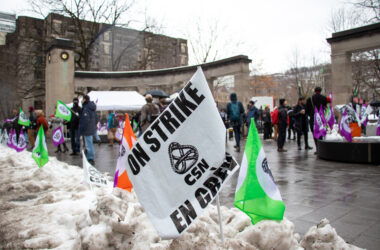The provincial government fined McGill more than $2 million last week in response to the university’s controversial tuition hike for its MBA program, which raised to tuition to $29,500 per year.
The massive increase in tuition—which had previously been $2,068 for Quebec students and $5,668 for students from other provinces—was announced last year as part of a shift to a self-funded model for the program, rather than one reliant on government funding.
McGill has argued that the move was essentially a necessity. Under the previous funding model, McGill received approximately $12,000 per year in revenue from tuition and government grants. The MBA program costs about $22,000 per student to run, forcing the university to subsidize the program with funds from other areas to the tune of $10,000 per student each year.
Other Canadians universities have taken similar steps in recent decades. Queen’s University switched their MBA program to a self-funded model in the 1990s, and the University of Western Ontario, the University of Toronto, and the University of British Columbia have done so as well.
Despite repeated warnings from Quebec’s former education minister, Michelle Courchesne, and the current minister, Line Beauchamp, Faculty of Management Dean Peter Todd said he had not expected the $2 million fine—the equivalent of a $10,993 penalty for each MBA student.
“We’re surprised, we’re disappointed, and we’re a bit puzzled,” Todd said.
Quebec City, however, has characterized McGill’s tuition hike as a unilateral violation of the rules governing university funding in the province. In a press release, Beauchamp said that “keeping universities on equal financial footing is crucial to making them accessible to all.”
“McGill’s decision violated current budgetary rules,” she said in the press release, “and a penalty will be applied until the situation is corrected.”
Current students and alumni of the MBA program have expressed mixed feelings about the dramatic increases in tuition. Bob Dorrance, a 1977 MBA graduate who is currently the president and chairman of TD Securities, reminisced about the low tuition when he attended McGill.
“When I was in MBA, we used to pay $400 a year,” he said, “and in my second year, tuition actually decreased.”
But the increase, Dorrance said, is necessary now for McGill to compete on a global level. In a statement, Pat Tenneriello, the president of McGill’s MBA Student Association, echoed this sentiment.
“We as students believe that the increased costs are a necessary part of McGill’s efforts to make this program into one of the best of the world,” he said. “We oppose any actions taken that may hinder the university’s attempt to make this a reality.”
McGill’s efforts to improve the program may have paid dividends in at least one important measure. In its ranking of MBA programs this year, the Financial Times ranked McGill 57th in the world—a leap of 38 spots over its ranking last year. In addition, Canadian Business magazine recently reported that students entering McGill’s MBA program have the highest average GMAT scores of any university in Canada.
In the wake of the fine, McGill has no plans to re-examine its tuition model, Todd said.
“We are carrying on with our program,” he said. “We don’t have a choice but to operate this way if we want the program to thrive.
McGill, he said, has not yet determined how it will make up the $2 million gap in funding. The university remains in discussions with the province about the fine, however, and Todd has hopes for reaching an agreement.
“I do believe, despite the application of this fine, that the minister has left some doors open,” he said.
Additional reporting by Theo Meyer.








